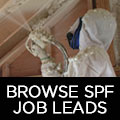Q&A Forums
Additions to occupied spaces? Post New Topic | Post Reply
| Author | Comments |
|---|---|
|
Dave Strnad
Posted: Dec 19, 2007 06:22 PM
|
Additions to occupied spaces?
Mason,What would be good operating practices when insulating additions to occupied houses. I usually suggest the people stay somewhere else for a couple of days. I try to do a good job of sealing off the new and old spaces and turning off and blocking any connected hvac. I usually can not smell anything in the occupied space afterward, however what would be a safe practice liability wise. Should I demand the house be vacant for x number of hours or days? If so how many? Should I make them sign a waiver if they choose not to vacate the house? What other advice can you offer about this topic? |
|
mason
Posted: Dec 20, 2007 07:26 AM
|
This is an important issue for all sprayfoam contractors. It is part of your implied warranty to provide the service and products that you have contracted for, that work is as advertised, the foam is as specified and that you DO NO HARM to persons or property SPF during application gives of fumes and mists that are harmful to the health of those in the immediate area of the application. Studies have indicated that MDI fumes and mists typically dissipate within a few hours of application. However, in some cases, odors can linger for days. In order to protect your customers, it is a good idea to not have anyone in the house while you are spraying. Research is not conclusive as to how far away from the point of application that one can be without being exposed to harmful mists and fumes. You can't use smell as an indicator. Most of the time, when you spray SPF you are smelling the catalyst in the foam. Depending on the concentration level, this can be hazardous or not. Without an air monitor on site, it is typically best to not have anyone in the house without a respirator and eye protection. I think your policy is a conservative one that is less likely to result in liability. Don't have them sign a waiver, it is not going to help you in court. Even if concentrations of MDI or other chemicals are lower than the personal exposure levels for the specific chemicals, some persons are very sensitive to chemical odors and will complain. Odors have also been known to trigger asthma attacks. So, it is better to be conservative. Also, ask your supplier if they have performed air quality monitoring on their foam. They may have data that you can use to determine your policy on exposure. Check out safety and health docs relating to SPF applications at sprayfoam.org and polyurethane.org |





























